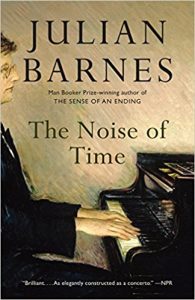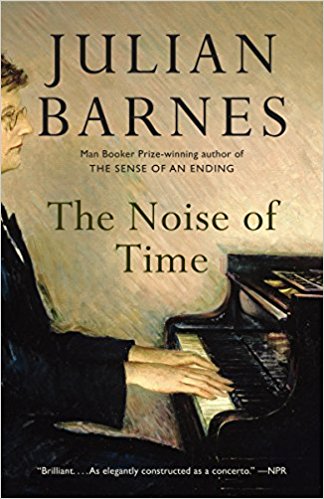 I love the slyness, insider insinuations, hints, the elegance and sophistication of Barnes’s writing in The Noise of Time.
I love the slyness, insider insinuations, hints, the elegance and sophistication of Barnes’s writing in The Noise of Time.
He begins with a surreal scene in a train station going toward Moscow. We don’t know who is on the train platform; the character is “he” for twenty pages of panic, degradation, fear, memory, black humor, and mood.
Since the train “he” is on is headed toward Moscow, we assume the characters are Russian. On page 5 we learn that “he” heard “a factory siren in F sharp.” Hm. This is a highly trained musician. On page 15, the story returns to the train station in, we now find out, the town of Arkhangelsk; it is January 28, 1936. The story is coming into sharper focus. On page 20, it is revealed that his father’s name is “D. B. Shostakovich.” By the time we learn his name, we know that the previously unidentified main character, the composer Dmitri Shostakovich, is a high-strung, perpetually terrified person who has difficulty relating to others, had a difficult childhood, and is in deep trouble just because he is who he is, a transformative genius of a composer.
The opening 20 pages reminded me of television shows where an artist draws a line with no connection to anything, draws another line, then another, then oh! It’s a tiger! Or a piano!
The first manifest scene shows a desperate Shostakovich waiting by the elevator for the security services to come and arrest him. “But it was probable that he looked exactly what he was: a man, like hundreds of others across the city, waiting, night after night, for arrest.” What makes it even more tortuous for Shostakovich is that the arrest never comes, leaving him in a state of perpetual dread. Later in the book, he is arrested and briefly interrogated, but is the beneficiary of a miracle—the interrogator is himself arrested, and the authorities forget about Shostakovich…for the moment.
The teller of the story is a smooth-talking, cool-headed analyst, who adds his own observations. “Instead of killing him they had allowed him to live, and by allowing him to live, they had killed him. This was the final unanswerable irony to his life: that by allowing him to live, they had killed him.”
The story is not this-happened-then-that-happened. It is puffs of memory, emotion, mood, presented in paragraphs separated from each other by white space, sometimes lacking connection between them.
Power, representing Stalin and his minions, or maybe the desire for control over others that stalks all of us from time to time, is a protagonist throughout. “…Power’s reply would always be the same: ‘Repeat after me,’ it would say, ‘ART BELONGS TO THE PEOPLE‑V.I. LENIN”’ But, the narrator observes “…music, in the end, belonged to music. That was all you could say, or wish for.” I suppose this conclusion is meant to confirm that the nervous, trembling, selfish dedication of Shostakovich, and by extrapolation other artists, was untouchable by even the most authoritarian mind control.
The pivot of the story and of Shostakovich’s adult life, as presented in this book, is that moment in the Arkhangelsk train station, just before he learns that Stalin has walked out on a performance of his opera Lady Macbeth of Mtsensk. This is the kiss of death for the opera, and pretty nearly, the composer as well. Stalin’s brutal rejection haunts Shostakovich. All around him, he sees ordinary people, popular people, and powerful people disappear abruptly. At any moment it could happen to him or to his music. Stalin could have liquidated Shostakovich at any time, yet he didn’t. Maybe he realized he had already accomplished his goal. The narrator writes, “…in these times, people were always in danger of becoming less than fully themselves. If you terrorised them enough; they became something else, something diminished and reduced; mere techniques for survival.”
Perhaps the book is meant as a cautionary tale; here’s what happens when the whims of a single individual cripple the lives of millions. It doesn’t take much to rule by threat. After ruthlessly demolishing the opposition, you don’t even have to arrest people. Simply walking out of an opera can strike terror in the hearts of the composer and the performers for the rest of their lives, diminishing their professional and personal accomplishments.
On page 92, the narrator writes: “When you chop wood, the chips fly; that’s what the builders of socialism liked to say. Yet what if you found, when you laid down your axe, that you had reduced the whole timberyard to nothing but chips?”
This book, and Shostakovich’s life itself, ask the reader whether art is powerful enough to transcend the carnage, even when the artist is weak. What do you think?
You can find The Noise of Time on Amazon.com.
